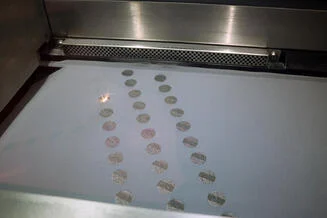MATERIALS CHARACTERIZATION PROBLEMS IN ADDITIVE MANUFACTURING TESTING
While the rapid growth of additive manufacturing (AM) technology has helped engineers in many industries create innovative new component designs, the unusual nature of the necessary raw materials and the resulting printed structures has created significant materials testing challenges.
- The intricate designs and the uniqueness of the sintered or deposited alloy microstructures create challenges in mechanical testing and metallography.
- The increasing development of new alloys that improve the performance and strength of sintered structures, as well as minimizing the need for post print processing, create interesting challenges in analytical chemistry.
- The lack of known properties for the many new alloys and materials results in the need for determining a wide range of fundamental properties, such as true microstructure, density, strength, fracture toughness and more.
- In addition, the rapid growth of AM implementation at start-ups and existing companies has resulted in not only materials testing challenges but significant issues with capacities and skilled engineers in the laboratory industry.

The raw materials used in 3D printing are diverse: wire and powdered nickel, steel and titanium alloys; polymer resins and filaments. There has been a constant push towards lighter, stronger, and tougher materials in just about every market sector as AM expands its capabilities to produce ever more varied products. While the technology both in raw materials and production methods has evolved greatly, the need for determining critical material characteristics is vital if AM is to continue to advance its capacity for creating complex and durable products, especially in high performance applications.
As 3D printing becomes more mainstream, there will be more challenges to accurately testing the materials characteristics of both raw materials and finished products. A quick turnaround for the quote and job will help manufacturers leverage the nimble nature of AM for continuous product and process improvement.
MECHANICAL TESTING METHODS
Abrasion (Taber)
Adhesion (Peel) Testing
Bend Testing
Bond Strength Testing
Charpy Impact Testing (-320°F to 450°F)
Climbing Drum Adhesion of Sandwich Composites
Coating Adhesion
Coating Shear Fatigue
Coefficient of Thermal Expansion by TMA
Composite Testing (Fiber Reinforced)
Compression Set
Compressive Properties
Core Shear Properties of Sandwich Construction by Beam Flexure
Creep and Stress Rupture Testing
DMA (Dynamic Mechanical Analyzer)
Ductility
Elastic Modulus
Fatigue Testing
Filled Hole Tension & Compression
Flattening
Flat-wise Tensile Testing
Flexural Properties
Floating Roller Peel Strength
Fracture Mechanics
Gel Time
Hardness (Rockwell, Brinell, Durometer, Shore, Barcol, Knoop, Vickers, Macro Vickers)
Heat Aging
Heat Deflection by TMA
Heat Treatment (furnace to 2100°F)
Hydrogen Embrittlement
Hydrostatic Pressure
Indentation Toughness
Interlaminar Shear
Jominy Hardenability
Lap Shear Testing
Machining & Specimen Preparation
Materialography
Modulus of Rupture (MOR)
n-Value (Strain Hardening Exponent)
Open Hole Tension and Compression
Pipeline Integrity Testing
r-Value (Plastic Strain Ratio)
Residual Strength of Composites After Impact
Rotating Beam Fatigue
Shear Testing of Rivets to ASTM B565, Single/Double
Short Beam Strength
Shot Peen Qualification
Single-Edged Notched beams (SENB)
Slow Strain Rate (G129)
Specimen Conditioning
Strain Gaging
Surface Roughness (ANSI/ASME B46.1)
T Peel Strength
Tear Resistance of Films & Sheeting
Tear - Rubbers & Elastomers
Tensile Testing
Torsional and Axial Fatigue (200 lb)
Tube Testing (Tensile, Flare, Hydrostatic)
Welder & Procedure Qualification
Wire/Spring Testing (Wrap, Coil, Bend)
Young's, Tangent and Chord Modulus (Room Temperature)
RELATED ADHESION STRENGTH TESTS
Shear Testing
Lap Shear Testing
Paint Adhesion Testing
RELEVANT ACCREDITATIONS
Click here for a complete list of accreditations and certifications for all IMR Test Labs locations.


